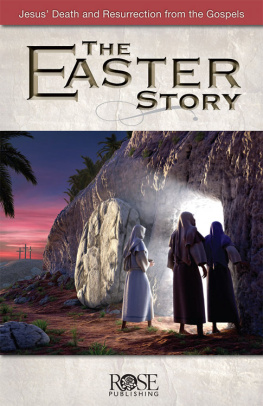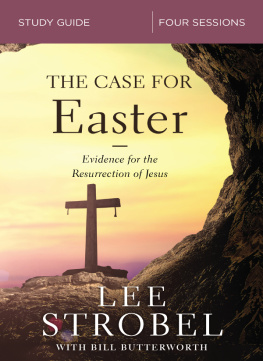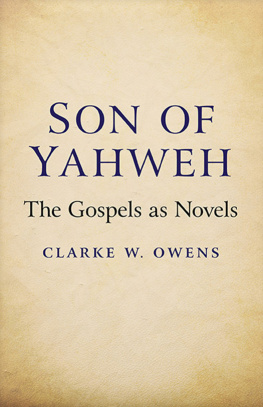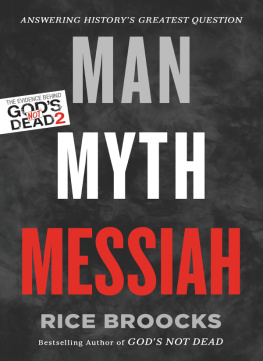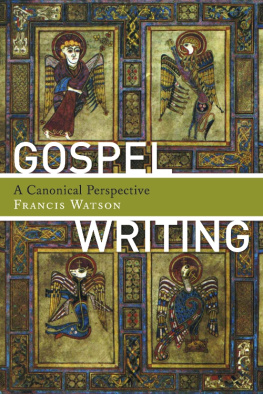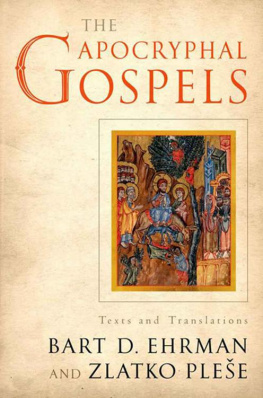



To Susan McCraw Helms
CONTENTS
I
THE ART OF THE GOSPELS
Theology as Fictional Narrative
In the first century of the Common Era, there appeared at the eastern end of the Mediterranean a remarkable religious leader who taught the worship of one true God and declared that religion meant not the sacrifice of beasts but the practice of charity and piety and the shunning of hatred and enmity. He was said to have worked miracles of goodness, casting out demons, healing the sick, raising the dead. His exemplary life led some of his followers to claim he was a son of God, though he called himself the son of a man. Accused of sedition against Rome, he was arrested. After his death, his disciples claimed he had risen from the dead, appeared to them alive, and then ascended to heaven. Who was this teacher and wonder-worker? His name was Apollonius of Tyana; he died about 98 A.D., and his story may be read in Flavius Philostratus's Life of Apollonius.
Readers who too hastily assumed that the preceding described Apollonius's slightly earlier contemporary, Jesus of Nazareth, may be forgiven their error if they will reflect how readily the human imagination embroiders the careers of notable figures of the past with common mythical and fictional embellishments. The career of any remarkable person is remembered in oral tradition precisely by being mythicised, connected with certain almost universally known patterns. Mircea Eliade gives us the example of Dieudonne de Gozon, a medieval Grand Master of the Knights of St. John at Rhodes who, according to legend, slew the dragon of Malpasso. It makes no difference, writes Eliade, that the genuine historical record concerning Dieudonne is innocent of dragons; the mere fact that the man was, in the popular imagination, a hero, necessarily identified him with "a category, an archetype, which, entirely disregarding his real exploits, equipped him with a mythical biography from which it was impossible to omit combat with a reptilian monster."2
We may say much the same of Jesus of Nazareth, though without needing to insist that all the mythical biographies of this figure entirely disregard his genuine acts. Moreover, I shall use the word "fiction" rather than the word "myth" to refer to the study, contained in this book, of the fictional aspects of the four canonical Gospels. By fiction I mean-to put the matter in simplest terms at the outset-a narrative whose purpose is less to describe the past than to affect the present. Of course, all works of fiction have an element of history, all works of history an element of fiction.3 The Gospels, however-and this is my thesis-are largely fictional accounts concerning an historical figure, Jesus of Nazareth, intended to create a life-enhancing understanding of his nature. The best biblical statement of the purpose of a gospel is found in the Gospel of John:
There were indeed many other signs that Jesus performed in the presence of his disciples, which are not recorded in this book. Those here written have been recorded in order that you may hold the faith that Jesus is the Christ, the Son of God, and that through this faith you may possess life by his name (John 20:30-31 NEB)
This is a noble intention, and it is not my purpose here to articulate a quarrel with Christian faith, or to call the evangelists liars, or to assert that the Gospels have no historical content; I write as literary critic, not as debunker. The Gospels are, it must be said with gratitude, works of art, the supreme fictions in our culture, narratives produced by enormously influential literary artists who put their art in the service of a theological vision. It is, of course, not uncommon to recognize literary artistry in the Gospels; there is perhaps no more beautiful short story than "The Prodigal Son," no more moving sentence in all world literature than "I am with you always, until the end of time" (Matt. 28:20). But what does it mean to say that the evangelists were literary artists? Literary artists use their imaginations to produce poetry and fiction, works open to the methods of literary criticism. The Gospels are, indeedand to a much greater degree than those who read them with pious inattention even begin to realize-imaginative literature, fiction, and critics have been using such terms about them for a long time. B. H. Streeter, for example, wrote more than half a century ago about the role of the "creative imagination" in the composition of the Fourth Gospel.4 Reginald Fuller has, more recently, examined the extent to which the Resurrection narratives are the "free creation" of the evangelists.5 Norman Perrin has declared that his approach to the Gospels, Redaction Criticism, looks for the "composition of new material" by the evangelists .6 I write in a similar spirit.
Each of the four canonical Gospels is religious proclamation in the form of a largely fictional narrative. Christians have never been reluctant to write fiction about Jesus, and we must remember that our four canonical Gospels are only the cream of a large and varied literature. We still possess, in whole or in part, such works as the Gospel of Thomas, the Gospel of Peter, the Gospel of Philip, the Secret Gospel of Mark, the Gospel of Mary Magdalene, and such anonymous gospels as those according to the Hebrews, the Egyptians, the Ebionites, and so on. Jesus is the subject of a large-in fact, still growing-body of literature, often unorthodox or pure fantasy, cast in the form of fictional narrative and discourse.
This literature was oral before it was written and began with the memories of those who knew Jesus personally. Their memories and teachings were passed on as oral tradition for some forty years or so before achieving written form for the first time in a selfconscious literary work, so far as we know, in the Gospel of Mark, within a few years of 70 A.D.7
But oral tradition is by definition unstable, notoriously open to mythical, legendary, and fictional embellishment. We know that by the .forties of the first century traditions already existed which we would now label orthodox and traditions coming to be recognized as heretical-teachings about what Jesus said and meant that even then were being called (though in a different vocabulary) "fictional." Paul, for example, writing to the Galatians about 50 A.D., declares, "I am astonished to find you turning so quickly away from him who called you by grace, and following a different gospel" (Galatians 1:6). Thirty or forty years later, Luke too was aware of both valid and invalid traditions about Jesus, aware that some kinds of information about Jesus were more accurate than others:
Many writers have undertaken to draw up an account of the events that have happened among us, following the traditions handed down to us by the original eyewitnesses and servants of the Gospel. And so I in my turn, your Excellency, as one who has gone over the whole course of these events in detail, have decided to write a connected narrative for you, so as to give you authentic knowledge about the matters of which you have been informed (Luke l: 1-4).




